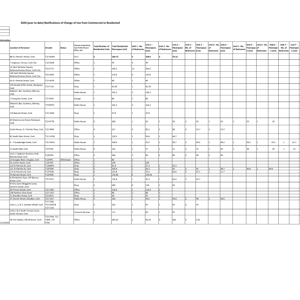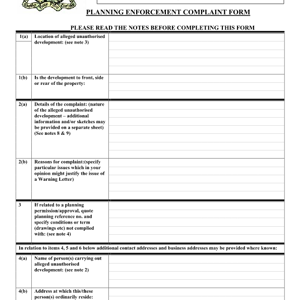- Home
- Council Services
- Services
- Planning
- Planning Enforcement
- Frequently Asked Questions
Frequently Asked Questions
Generally, unauthorised development falls into 3 categories:
- Planning permission is required for a development but has not been obtained.
- Non-compliance with a planning permission: in other words, a development is not carried out in accordance with the permission granted or any condition to which that permission is subject, and the development does not comply with the specified conditions and limitations to qualify as exempted development.
- Unauthorised development can relate to physical works such, as construction works, structures and alterations to structures, or to a material change of use of a structure or land.
You can inspect the Planning Register in the Planning offices in City Hall either in person, by telephone or by email, or you can inspect the Cork City Council Planning Enquiry System to see whether or not planning permission has been granted for the development in question.
It would be useful to check whether or not the development in question has planning permission before making a Planning Enforcement Complaint.
Irish planning laws set out that all development requires planning permission unless the laws specifically provide that permission is not required. Certain types of development are specified in law as not requiring planning permission – this type of development is called exempted development, and is set out in the Planning and Development Act 2000 and the Planning and Development Regulations 2001 as amended. There are usually certain thresholds stipulated for exempted development, such as size or height, and where these thresholds are exceeded, the exemptions no longer apply.
If a question arises as to whether any particular development is or is not exempted development, a person may request a Section 5 Declaration from the planning authority on this question.
You can make a complaint by completing the Planning Enforcement Complaint Form and either posting it to the Planning Enforcement Section, Cork City Council, City Hall, Cork or emailing it to planningenforcement@corkcity.ie
This form includes two pages, both of which are should be completed. Please ensure to fill out as much detail as you can. You may also attach photographs (to be dated) if you wish. All forms must be signed by the complainant and an address provided for correspondence.
The form also has explanatory notes that should be read before completing the form.
You should provide the exact location of the site, details of the suspected unauthorised development, details (where known) of the property owner, occupier, and developer / person carrying out the suspected unauthorised development, the date on which the development began, your own name and address and a daytime contact number. Anonymous or unsigned complaints will not be investigated.
If you make a Planning Enforcement Complaint your details are treated in the greatest confidence and are not released to any third party and are not entered in Cork City Council’s Planning Register. It is Cork City Council’s policy to keep the name of the complainant confidential both during the course of any enforcement proceedings, and afterwards when the case is completed.
However, this information is subject to the provisions of the Freedom of Information Act 1997 as amended and accordingly may be subject to disclosure. In exceptional circumstances, this information may be subpoenaed by a Court. More information on Freedom of Information is available here.
The procedure and time limits for planning enforcement in Ireland are set out under Part VIII of the Planning and Development Act 2000 as amended. A common procedure is followed for all types of unauthorised development:
- issuing a warning letter
- serving of an enforcement notice, and
- initiating legal proceedings.
This process is explained in detail in a national guidance document published in 2012 by the Department of the Environment, Community and Local Government titled A Guide to Planning Enforcement in Ireland.
Every effort is made by Cork City Council to encourage compliance with planning legislation without having to resort to enforcement action. However, enforcement action may have to be, and is taken in a number of cases in order to resolve the matter.
Briefly, once a written complaint is received, the Planning Enforcement Section determines whether or not a warning letter should be issued to the person or persons carrying out the alleged unauthorised development. The warning letter allows the person to whom the letter was sent time to respond to Cork City Council in relation to the alleged unauthorised development. It is important to note that at warning letter stage, unauthorised development may or may not have been carried out. The warning letter process forms part of Cork City Council’s investigations and decision on whether or not unauthorised development has been carried out.
The next step in the process is the enforcement notice. Once a warning letter has been issued and the relevant timeframes have been observed, Cork City Council must carry out necessary investigations and consider any written submissions it receives, and decide whether or not to serve an enforcement notice. At this stage Cork City Council determines whether or not unauthorised development has taken place, and the enforcement notice sets out the requirements and timeframe for rectifying the unauthorised development. The serving of an enforcement notice also requires to the person(s) to whom it was sent to refund the costs of Cork City Council staff time and resources expended on the planning enforcement case – such costs incurred average €1,200. Non-compliance with an enforcement notice is an offence.
Should any person served with an enforcement notice fail to comply with its requirements, Cork City Council may institute legal proceedings in the District Court.
In cases of urgency, where Cork City Council is of the opinion that the particular nature of an unauthorised development that is taking place or may be about to take place requires urgent action it may move immediately to issue an enforcement notice or to seek an injunction, without having first issued a warning letter.
Under Irish planning law enforcement action must be taken within seven years of the development commencing. This does not mean however that the development concerned is authorised (see FAQ number 11 in this list).
In respect of a development for which permission has been granted, enforcement action can be taken up to seven years beginning on the expiration of the permission.
Planning enforcement action may be commenced at any time in respect of any condition attached to a planning permission concerning the use of land to which the permission is subject.
In accordance with planning law complaints received in writing by Cork City Council in relation to an alleged unauthorised development must not be vexatious, frivolous or without substance or foundation. Such complaints shall be dismissed.
Planning law also provides that, even if a development is unauthorised, a planning authority may consider that it is trivial or minor, and may decide not to take enforcement action.
Another instance where a planning authority may be precluded from taking enforcement action is if unauthorised development is “statute-barred” – in other words, no enforcement action took place within seven years of the development commencing (see FAQ number 7 in this list).
The penalties for breaches of planning law depend on the nature of the offence but if found guilty, could result in a criminal prosecution and a fine and / or a prison sentence or both.
A Guide to Planning Enforcement in Ireland sets out a summary of the offences and penalties applicable under Irish planning law.
Planning enforcement only relates to “unauthorised development”, which is described above in this FAQ.
Planning enforcement does not deal with matters that do not relate to unauthorised development, civil matters or matters that are addressed under other legislation and codes, including but not limited to the following:
Civil Matters
- encroachment
- property ownership or other legal issues
- private rights of way
- trespass
- civil boundary disputes
- noise nuisance (unless noise breaches a condition attached to a planning permission) In relation to noise please refer to Enfo for details on options available to you under law
- structural damage to private property resulting from construction works
- matters related to private drains
- outlets associated with boilers and other gas appliances (unless these have a material visual impact from a public area)
- other types of private nuisance
Matters addressed by other legislation and codes
- Building Regulations: contact Cork City Council’s Building Control section
- hoardings, signage, tables and chairs, and other structures in the public roadway or on footpaths (contact Cork City Council’s Roads Control section)
- neglect or endangerment of Protected Structures
- parking complaints (except where such parking breaches a condition attached to a planning permission or relates to an unauthorised car park)
- illegal parking in a Disc Parking Area can be referred to Cork City Council’s Transportation Division; other illegal parking (for example, parking on double yellow lines) can be referred to the Gardaí.
- blocked public sewers (contact Cork City Council’s Drainage section)
- litter, illegal dumping, water pollution, and other environmental matters (contact Cork City Council’s Environment Directorate)
If you think that you are or may be in breach of planning laws you should contact Cork City Council’s Planning Department to discuss rectifying the situation.
Even if the development is outside the time-frame for taking enforcement action (see FAQ number 7 in this list), it remains unauthorised and could have a negative impact on the value of the property. In addition, further works that may normally be considered exempted development (such as some alterations, repair or renewal works) may not be carried out to an unauthorised structure or a structure the use of which is unauthorised. It is in the interest of every property owner to ensure that any unauthorised development is regularised.
Irish planning law allows for the planning applications to be made to retain development that has already been constructed. While such a course of action is not normally recommended, it is acknowledged that sometimes genuine mistakes do occur and that planning law can be inadvertently breached.
In some cases it may be possible to ‘regularise’ development with a grant of retention planning permission. However, the circumstances under which retention permission is available are specified under law. A planning authority such as Cork City Council cannot accept an application for retention permission for any development which would have required:
- environmental impact assessment (EIA)
- a determination as to whether EIA was required (in other words, a screening for EIA)
- an appropriate assessment under the Habitats Directive
It is important to note that planning applications for retention permission are not given special consideration based on the fact that development has already been carried out.
Any application to retain development will be assessed based on development objectives set out in the Cork City Development Plan and on the principles of proper planning and sustainable development, taking into account any matter prescribed under law, including but not limited to any relevant national planning guidelines and any observations or submissions received.
If an application for retention permission of an unauthorised development is refused, the unauthorised development must be removed and / or the unauthorised use ceased.
You should be aware that the making of a planning application for retention of an unauthorised development is not a valid reason to delay or suspend the taking of planning enforcement action by Cork City Council.
You should also be aware that current planning law stipulates that planning application fees associated with retention applications are currently three times the amount of standard planning applications.
Prior to submitting an application for retention, it is advisable to contact the Cork City Council’s Development Management Planning Section to arrange a pre-application (or pre-planning) consultation.
The main legislative provisions governing the enforcement of planning law are set out under Part VIII of the Planning and Development Act 2000 as amended.
Also relevant is the national guidance document A Guide to Planning Enforcement in Ireland, and chapter 10 of the Development Management Guidelines for Planning Authorities 2007.
If you want to make a planning enforcement complaint you should follow the advice provided above in this FAQ and on Cork City Council’s website.
Gallery Modal































































































































































































































































































































































































































































































































































